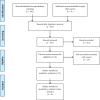What do people think about genetics? A systematic review
- PMID: 30406598
- PMCID: PMC6435762
- DOI: 10.1007/s12687-018-0394-0
What do people think about genetics? A systematic review
Abstract
Genetics is increasingly becoming a part of modern medical practice. How people think about genetics' use in medicine and their daily lives is therefore essential. Earlier studies indicated mixed attitudes about genetics. However, this might be changing. Using the preferred reporting items for systematic reviews and meta-analyses (PRISMA) as a guideline, we initially reviewed 442 articles that looked at awareness, attitudes, knowledge, and perception of risks among the general and targeted recruitment populations. After fitting our criteria (from the last 5 years, conducted in the USA, non-provider populations, quantitative results reported, and assessed participants 18 years and older), finally 51 eligible articles were thematically coded and presented in this paper. Awareness is reported as relatively high in the studies reviewed. Attitudes are mixed but with higher proportions reporting positive attitudes towards genetic testing and counseling. Self-reported knowledge is reasonably high, specifically with the effects of specific programs developed to raise knowledge levels of the general and targeted recruited populations. Perception of risk is somewhat aligned with actual risk. With the reasonable positive reports of genetic awareness and knowledge, there is similar positive attitude and perception of risk, supporting the need for continued dissemination of such knowledge. Given interest in incorporating community participation in genomic educational strategies, we provide this review as a baseline from which to launch community-specific educational supports and tools.
Conflict of interest statement
Conflict of interest
Erin LePoire, Deborah Bowen, Lorelei Walker, and Bashakhi Basu declare that they have no conflicting interests.
Ethical approval
This article does not contain any studies with human or animal subjects performed by any of the authors.
References
-
- Allain DC, Friedman S, Senter L. Consumer awareness and attitudes about insurance discrimination post-enactment of the Genetic Information Nondiscrimination Act. Familial Cancer. 2012;11(4):637–644. - PubMed
Publication types
LinkOut - more resources
Full Text Sources


